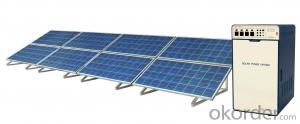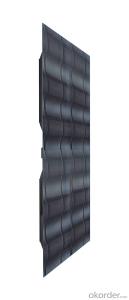Off-grid Solar Power System JS-SPS-2000
- Loading Port:
- Tianjin
- Payment Terms:
- TT OR LC
- Min Order Qty:
- 10 set
- Supply Capability:
- 10000 set/month
OKorder Service Pledge
Quality Product, Order Online Tracking, Timely Delivery
OKorder Financial Service
Credit Rating, Credit Services, Credit Purchasing
You Might Also Like
General Introduction
Solar power system provides alternating current and direct current, which is produced by the modules transforming solar power into power, to home lighting, household appliance and other DC appliance, such as cell phone and laptop.
Solar power system is widely used in area lack of power, for example house power supplying, monitoring, communication base, fire prevention in forest area, pasture and meadow, aquaculture etc.
We are dedicated to provide high quality off-grid PV products and systems to customers and has received a series of certificate, including ISO9001, TUV, UL, CE, CQC and RoHS.
Off-grid Solar Power System
High efficent PV module can produce more power.
Sine wave output is suitable for all kinds of load. Varieties of DC output, let it more
convenient for users.
The multifunction design make it easy to operation and maintenance.
Solar power system provides alternating current and direct current, which is produced by the modules transforming solar power into power, to home lighting, household appliance and other DC appliance, such as cell phone and laptop.
Solar power system is widely used in area lack of power, for example house power supplying, monitoring, communication base, fire prevention in forest area, pasture and meadow, aquaculture etc.
We are dedicated to provide high quality off-grid PV products and systems to customers and has received a series of certificate, including ISO9001, TUV, UL, CE, CQC and RoHS.
Off-grid Solar Power System
High efficent PV module can produce more power.
Sine wave output is suitable for all kinds of load. Varieties of DC output, let it more
convenient for users.
The multifunction design make it easy to operation and maintenance.
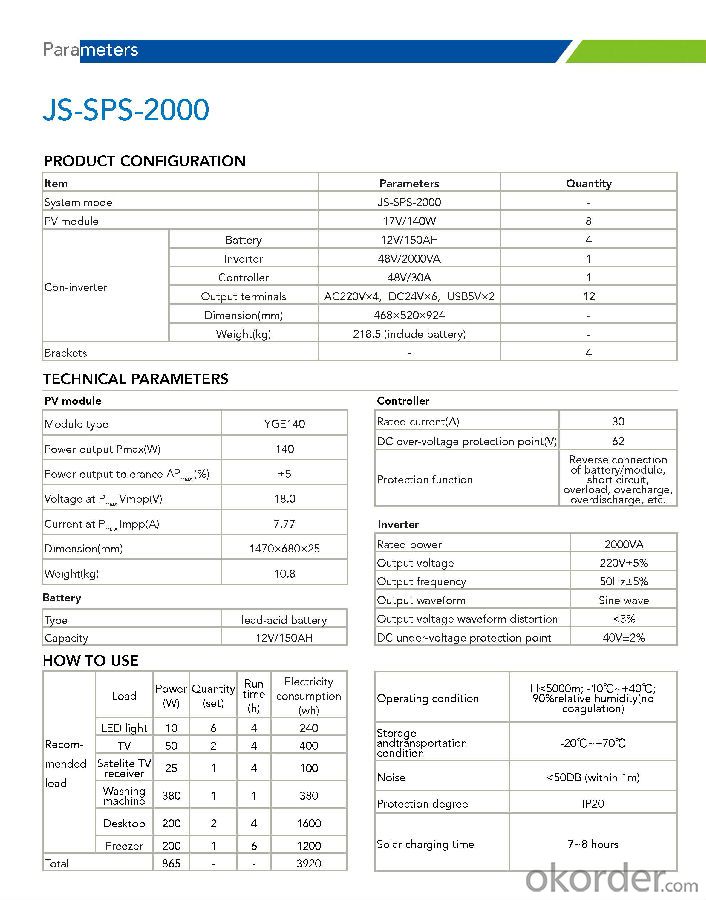
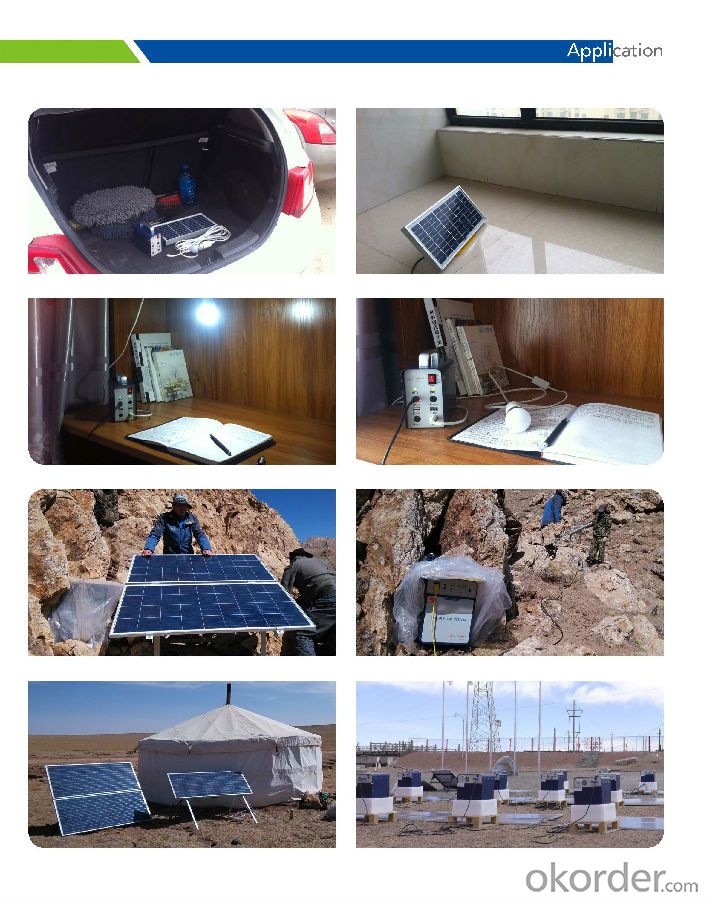
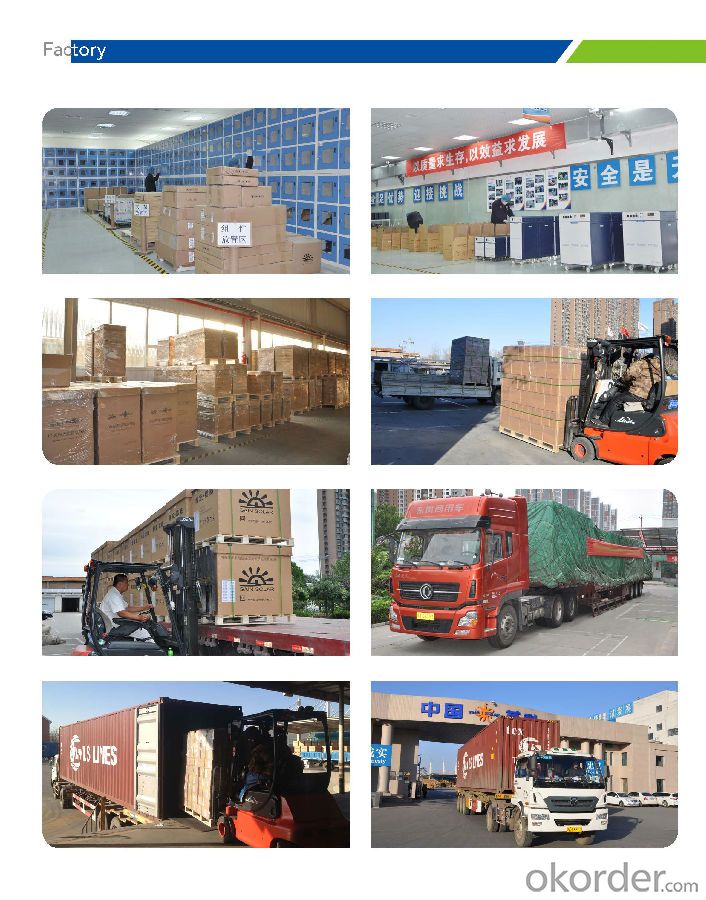
- Q:Can solar energy systems be used in powering research farms or agricultural laboratories?
- Yes, solar energy systems can certainly be used to power research farms or agricultural laboratories. Solar panels can generate electricity which can be used to power various equipment and machinery used in these facilities, such as irrigation systems, lighting, climate control systems, and other electrical devices. By utilizing solar energy, these agricultural facilities can reduce their reliance on fossil fuels and significantly lower their operational costs while also contributing to a more sustainable and environmentally friendly approach to farming and research.
- Q:What is the role of solar energy monitoring systems?
- The role of solar energy monitoring systems is to track and evaluate the performance of solar energy systems. These systems collect real-time data on the amount of sunlight received, the energy generated, and the energy consumed. By continuously monitoring the performance of the solar panels, inverters, and other components, these systems help in identifying any issues or inefficiencies in the system. Solar energy monitoring systems provide valuable insights into the overall health and performance of the solar energy system. They enable system owners or operators to identify any underperforming panels, shading issues, or faulty equipment. This allows for prompt maintenance or repairs, minimizing downtime and maximizing the energy production and financial returns. Furthermore, these monitoring systems can also provide data on energy consumption patterns, allowing users to understand their energy usage and optimize it accordingly. By having access to detailed real-time and historical data, users can make more informed decisions about energy consumption and take steps to reduce their carbon footprint. Solar energy monitoring systems play a crucial role in ensuring the long-term success and efficiency of solar energy systems. They provide valuable data and insights that contribute to system optimization, maintenance, and overall performance improvement. Ultimately, these systems help in maximizing the benefits of solar energy, both economically and environmentally.
- Q:Can solar energy systems be used in powering veterinary clinics or animal shelters?
- Certainly, solar energy systems have the capability to power veterinary clinics and animal shelters with great efficiency. These systems, such as solar panels, have the ability to capture the energy from sunlight and convert it into usable electricity. This electricity can then be utilized to operate a wide range of electrical appliances and devices that are essential in these establishments. By installing solar panels either on the roof or in an open area close to the veterinary clinic or animal shelter, these facilities can minimize their reliance on conventional electricity sources and instead take advantage of the clean and renewable solar energy. This sustainable power can be utilized to operate crucial equipment like lights, heating and cooling systems, medical devices, refrigerators for vaccines and medications, computers, and other necessary devices. Moreover, the utilization of solar energy systems can lead to long-term cost savings for these establishments. Veterinary clinics and animal shelters typically consume a significant amount of electricity due to the nature of their operations, which involve maintaining appropriate temperature and lighting conditions, operating medical equipment, and ensuring a comfortable environment for the animals and staff. By harnessing solar power, these establishments can considerably reduce their electricity expenses, enabling them to allocate more resources towards the care and welfare of animals. Furthermore, the adoption of solar energy systems in veterinary clinics and animal shelters aligns perfectly with their commitment to environmental sustainability. By decreasing their dependency on fossil fuels and embracing the use of clean and renewable solar energy, these establishments can actively contribute to the reduction of carbon emissions and the minimization of their ecological impact. In conclusion, solar energy systems serve as a highly effective solution for powering veterinary clinics and animal shelters. They provide a reliable and sustainable source of electricity, reduce operational costs, and display a strong dedication to environmental responsibility.
- Q:How does the quality of solar panels affect their performance?
- The quality of solar panels plays a crucial role in determining their performance. High-quality solar panels are designed and manufactured using advanced technology and materials, which directly impacts their efficiency, durability, and reliability. Efficiency is one of the key factors affected by the quality of solar panels. High-quality panels are built with superior materials and advanced manufacturing techniques, allowing them to convert sunlight into electricity more efficiently. This means that they can generate more electricity from the same amount of sunlight compared to lower-quality panels. Durability is another important aspect influenced by the quality of solar panels. High-quality panels are designed to withstand harsh weather conditions, such as extreme temperatures, strong winds, and heavy snow loads. They are also less prone to degradation, ensuring a longer lifespan and consistent performance over time. Reliability is closely tied to the quality of solar panels. High-quality panels are built to last, reducing the chances of malfunctions or breakdowns. They undergo rigorous testing and quality control processes to ensure that they can consistently deliver their rated power output for many years. Additionally, high-quality solar panels often come with industry-leading warranties, providing peace of mind to the owners. These warranties cover defects, performance issues, and other potential problems, ensuring that customers receive support and replacements if needed. In summary, the quality of solar panels significantly impacts their performance. Investing in high-quality panels can lead to higher energy production, increased durability, and improved reliability, ultimately resulting in better returns on investment and a more sustainable energy solution.
- Q:How do solar energy systems impact renewable energy targets?
- Solar energy systems have a significant positive impact on renewable energy targets. These systems harness the power of sunlight, a virtually unlimited and clean energy source, to generate electricity. By increasing the share of solar power in the energy mix, they help reduce dependence on fossil fuels, lower carbon emissions, and contribute to a more sustainable energy future. Furthermore, solar energy systems play a crucial role in diversifying the renewable energy portfolio, enhancing energy security, and promoting the achievement of renewable energy targets at a faster pace.
- Q:What is the impact of solar energy systems on air quality?
- Air quality is positively impacted by solar energy systems. In contrast to coal or natural gas, solar energy does not emit harmful substances or pollutants while operating. This means that solar power does not contribute to the release of greenhouse gases, particulate matter, sulfur dioxide, nitrogen oxide, or any other air pollutants associated with burning fossil fuels. Through the utilization of solar energy systems, we can greatly decrease our dependence on fossil fuels, leading to a reduction in air pollution levels. This has numerous advantages for human health and the environment. Improved air quality can result in lower rates of respiratory and cardiovascular diseases, as well as a decrease in respiratory symptoms and allergies. Moreover, solar energy systems aid in the overall reduction of smog, acid rain, and the potential for global warming. Additionally, the installation and use of solar energy systems do not generate noise pollution, which is another significant benefit compared to traditional energy sources. This reduction in noise pollution has positive effects on the well-being and overall quality of life for individuals living near solar installations. In conclusion, the adoption of solar energy systems is a crucial step in improving air quality and mitigating the adverse effects of climate change. By harnessing the power of the sun, we can substantially decrease air pollution, promote cleaner and healthier environments, and create a more sustainable future for future generations.
- Q:What is the maintenance process for solar panels?
- Solar panels require regular cleaning, inspection, and occasional repairs for proper maintenance. To maximize sunlight absorption and maintain efficiency, it is important to clean the panels with a soft brush or cloth and mild detergent, avoiding abrasive materials or harsh chemicals. Regular inspections are crucial to detect any potential issues or damages. Homeowners or professional solar panel technicians can perform these inspections at least once or twice a year, or after severe weather conditions. Loose connections, cracks, or signs of wear and tear should be checked for. If repairs are needed, it is best to contact a professional technician or the manufacturer who has the expertise to handle them safely. Attempting repairs without proper training can lead to further damage or safety risks. Monitoring the performance of the solar panels is also essential. Many modern systems offer monitoring tools that allow homeowners to track energy production and identify any potential issues. Regularly reviewing this data helps address drops in efficiency or irregularities promptly. By following a regular maintenance routine, homeowners can ensure their solar panels generate clean and renewable energy efficiently, potentially extending their lifespan to 25 years or more.
- Q:Can solar energy systems be used in areas with high levels of windborne debris?
- Solar energy systems can indeed be used in areas with high levels of windborne debris. Although there is a risk of damage or obstruction to solar panels from windborne debris like tree branches or other objects, there are ways to address these concerns. A common approach is to install protective measures such as wire mesh screens or barriers around the solar panels. These screens allow sunlight to pass through while shielding the panels from potential damage caused by debris. Furthermore, optimizing the design and mounting of solar panels can enhance their ability to withstand high winds and debris. By installing panels at an angle that allows debris to slide off, accumulation can be prevented. Additionally, reinforcing mounting systems ensures stability during strong winds. Regular maintenance and cleaning of the panels are also crucial in areas prone to windborne debris. This practice eliminates any accumulated debris, guaranteeing optimal efficiency. It is important to note that the advantages of solar energy, including its environmental friendliness and cost-effectiveness, often outweigh the potential risks associated with windborne debris. With careful planning, installation, and maintenance, solar energy systems can be effectively utilized in areas with high levels of windborne debris.
- Q:Are there any tax credits available for installing a solar energy system?
- Yes, there are tax credits available for installing a solar energy system. The federal government offers a Solar Investment Tax Credit (ITC) which allows homeowners and businesses to deduct a percentage of the cost of installing a solar energy system from their federal taxes. As of 2021, the ITC offers a 26% tax credit for systems installed through the end of 2022. However, it is important to note that the tax credit will decrease to 22% in 2023 and will only apply to commercial installations. Additionally, some states also offer their own tax incentives for solar energy systems, such as tax credits, rebates, or exemptions. It is recommended to check with your state or local government to determine if there are any specific tax credits available in your area.
- Q:Can a solar energy system be used to heat water?
- Certainly! A solar energy system has the capability to warm water. Solar water heaters utilize the energy from the sun to heat water for a multitude of purposes, including household usage, swimming pools, and industrial operations. These systems usually comprise solar collectors that absorb the sun's radiation and transmit the heat to a fluid. This fluid is subsequently circulated to warm the water contained in a tank. Solar water heaters are highly efficient, economical, and eco-friendly substitutes for conventional water heating techniques. They have the potential to substantially decrease energy expenses and emissions of greenhouse gases, all while ensuring a consistent supply of hot water throughout the year.
1. Manufacturer Overview |
|
|---|---|
| Location | |
| Year Established | |
| Annual Output Value | |
| Main Markets | |
| Company Certifications | |
2. Manufacturer Certificates |
|
|---|---|
| a) Certification Name | |
| Range | |
| Reference | |
| Validity Period | |
3. Manufacturer Capability |
|
|---|---|
| a)Trade Capacity | |
| Nearest Port | |
| Export Percentage | |
| No.of Employees in Trade Department | |
| Language Spoken: | |
| b)Factory Information | |
| Factory Size: | |
| No. of Production Lines | |
| Contract Manufacturing | |
| Product Price Range | |
Send your message to us
Off-grid Solar Power System JS-SPS-2000
- Loading Port:
- Tianjin
- Payment Terms:
- TT OR LC
- Min Order Qty:
- 10 set
- Supply Capability:
- 10000 set/month
OKorder Service Pledge
Quality Product, Order Online Tracking, Timely Delivery
OKorder Financial Service
Credit Rating, Credit Services, Credit Purchasing
Similar products
New products
Hot products
Related keywords
